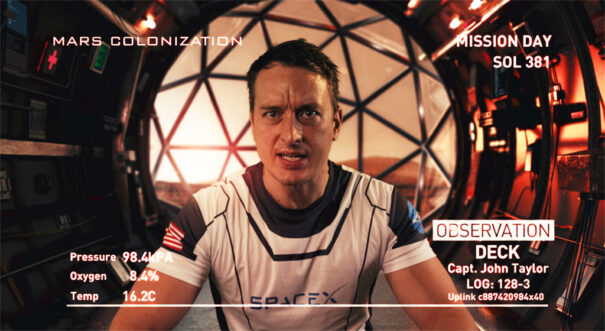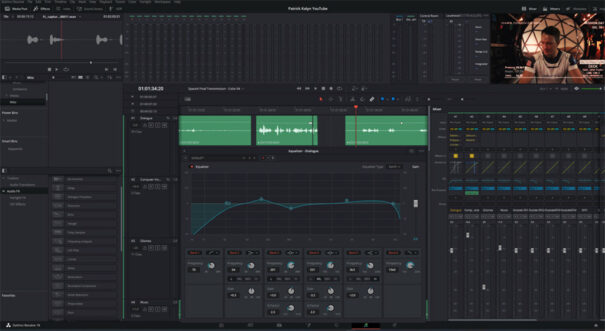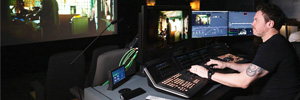Patrick Kalyn postproduces his latest short film with DaVinci Resolve’s Fusion and Fairlight modules
The Fusion and Fairlight modules in Blackmagic Design’s DaVinci Resolve software have enabled visual effects artist Patrick Kalyn, who has worked on Deadpool 2 そして Blade Runner 2049, to postproduce his latest sci-fi short film.
Patrick Kalyn created SpaceX Final Transmission with the aim of turning to acting to improve his work as a director. In the piece, Captain Taylor (Kalyn) transmits a final message from a failed Mars base to warn the crew of a spacecraft from space that their lives are in danger, implying that the members of his crew have gone mad. Everything, of course, is his own creation: “It was the perfect project to put Resolve through its paces. I shot it in my living room with a few lights and a green screen since the film is told through a video message sent by Captain Taylor. The short is part of a larger story that I’m currently writing.”
 Compositing was done in DaVinci Resolve Studio’s Fusion module. Kalyn relied on a number of tools to create the visual effects environments, including the Delta compositor to remove the green background, the base image node and the Boolean operators for the channels: “I didn’t shoot a clean plate, so I used the clean plate node and cranked up the erode value to fill in the gaps. The CG environment was rendered in layers, so I had to assemble the beauty pass in Fusion with Channel Booleans. The landscape you see outside the observation window is an actual picture of Mars’ surface from the new Perseverance rover. Once I had the environment built, I comped random code elements on the computer screens, as well as light dust and debris floating around, so the background didn’t feel totally dead.”
Compositing was done in DaVinci Resolve Studio’s Fusion module. Kalyn relied on a number of tools to create the visual effects environments, including the Delta compositor to remove the green background, the base image node and the Boolean operators for the channels: “I didn’t shoot a clean plate, so I used the clean plate node and cranked up the erode value to fill in the gaps. The CG environment was rendered in layers, so I had to assemble the beauty pass in Fusion with Channel Booleans. The landscape you see outside the observation window is an actual picture of Mars’ surface from the new Perseverance rover. Once I had the environment built, I comped random code elements on the computer screens, as well as light dust and debris floating around, so the background didn’t feel totally dead.”
Kalyn also used tools such as depth blur to soften the focus the further the distance from the camera. Similarly, he added a soft glow over the character’s shoulder to improve the blending of the background with the base image; a bit of optical distortion to the background to make it look less computerised; and he added dirt to the walls by merging multiple images in multiply mode.
Audio with DaVinci
Patrick Kalyn also used DaVinci Resolve Studio’s Fairlight module to create audio effects during post-production, as he says: “After I worked on the dialogue, it was a matter of layering in sound effects (SFX) and music from my sound library. I had separate tracks for SFX that happened inside versus outside the observation deck. A heavy low pass filter on the outside tracks’ EQ made it sound like it’s coming through thick walls.”
“I mix as I edit sounds by setting the volume of each sound on a per clip basis. I used the volume sliders for more macro adjustments to the entire track. I love the DIM toggle near the volume slider; it comes in super handy when you’re auditioning sounds, so you don’t shock your ears with loud SFX,” he adds.
The experience of working with DaVinci Resolve has been absolutely great for Kalyn: “The big takeaway from doing this VFX short from end to end inside Resolve is that a filmmaker has everything they need to produce exceptional, high quality content, all inside one software.”
¿Te gustó este artículo?
Suscríbete a nuestro RSSフィード Y no te perderás nada.

















